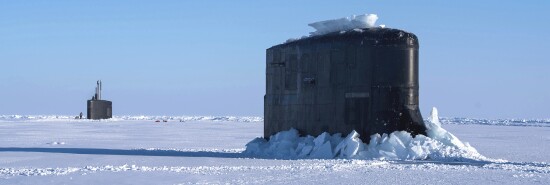
Trump’s submarine comments would be stupid but do not appear classified
Tom Rogan
Video Embed
ABC News reports that former President Donald Trump told Australian billionaire Anthony Pratt “the supposed exact number of nuclear warheads [U.S. ballistic missile submarines] routinely carry, and exactly how close they supposedly can get to a Russian submarine without being detected.”
To its credit, ABC News notes only that the information was “potentially sensitive.” In contrast, CNN’s Wolf Blitzer referenced “very classified information” and former Director of National Intelligence James Clapper told Blitzer it’s “hard to overstate” how “extremely serious” the incident is.
DOES TAIWAN EVEN CARE IF IT CONTINUES TO EXIST?
On paper, any discussion of U.S. nuclear forces would appear to be highly detrimental and likely involving classified information. Except that concern over classified material requires a practical prerequisite. Namely, that hostile actors are not already aware of what the classified material would otherwise tell them. It is thus noteworthy that special counsel Jack Smith was made aware of these submarine allegations but did not indict Trump in relation to them. That in mind, here are some things that the Russian navy and the People’s Liberation Army Navy (thanks largely to the Russian navy) already know.
They know that U.S. nuclear attack submarines can get within a few feet of their own submarines without being detected. Indeed, they know that their first counter-detection can come with collision. They know that the U.S. has 14 nuclear ballistic missile submarines. They know that each of these submarines carries 20 Trident missiles and that those missiles are each loaded with between five to eight warheads (with a capacity for 12 warheads per missile). That’s 100-160 warheads per submarine. They know that were U.S. Strategic Command to fear war, it would surge its ballistic missile fleet out to sea and load each submarine’s missile to its max 12-warhead capacity. They know that nearly every time one of their own nuclear ballistic missile submarines departs Hainan Island, Qingdao, Vladivostok, or Murmansk, a U.S. nuclear attack submarine will attempt to shadow that submarine for the duration of its patrol. They know the U.S. will hold their missile submarines at risk of immediate destruction in the event of war. They know that U.S. nuclear attack submarines can operate undetected in their territorial waters. They know that these submarines can secretly deploy and extract special operations or intelligence personnel onto or from their soil. They know that U.S. nuclear submarines can access, lay, and retrieve highly sensitive intelligence, communications, and surveillance devices on the seafloor deep inside their territory. They know that U.S. submarine forces are unparalleled in skill and capability but increasingly weakened by a mismanaged industrial base. Both China and Russia are advancing their own submarine forces so as to take advantage of this vulnerability.
Do not misunderstand me. Had Trump told Pratt about U.S. submarine patrol sectors, tactics, strike packages, and specific missions, he would deserve to have the book thrown at him. And if the Justice Department can prove the assertions listed in its indictment of Trump over his handling of dozens of classified documents, Trump will be convicted and should receive a custodial sentence. After all, these documents are said to include the holy grail of classified intelligence reporting: that related to nuclear weapons intelligence and CIA human agent reporting. The point here is that not all secret-sounding information is classified.
In turn, what’s concerning about this submarine saga is not what Trump appears to have told Pratt, but rather what his willingness to speak to Pratt about submarines indicates what he may have told others about different, classified issues.
